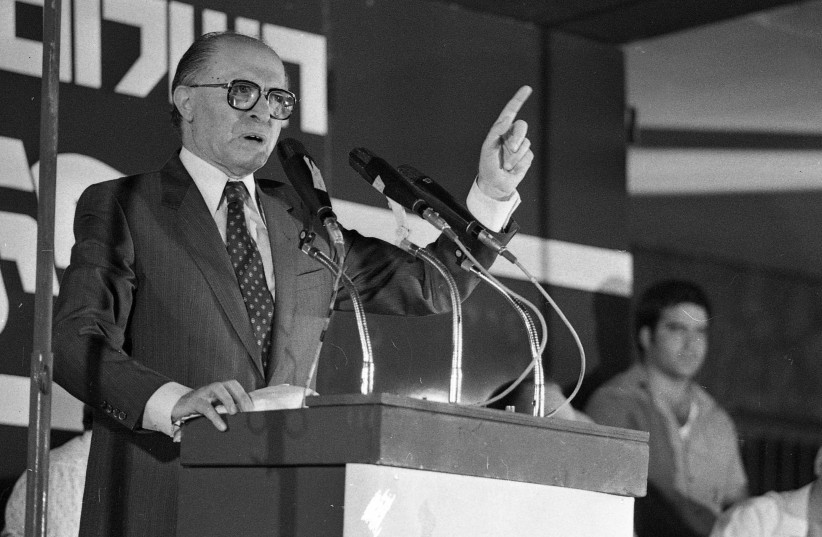Earlier this month, I visited Romania for a think tank dialogue. As we landed, I could not help thinking that some 45 years ago a Likud prime minister had flown to Bucharest to enlist the support of a Romanian communist autocrat in the quest for peace.
Israel and Romania will shortly celebrate 75 years of uninterrupted diplomatic relations, affording Romania a unique status in the post-communist world.
Independent-minded - but Stalinist to the core
Following the IDF’s victory in the June 1967 Six Day War, Moscow branded Israel an “imperialist aggressor” and severed diplomatic relations. The nations of the Soviet bloc expeditiously followed suit, with Bulgaria, Czechoslovakia, Hungary, and Poland all breaking off ties. Romania was the sole Warsaw Pact country to buck the otherwise uniform trend.
Bucharest’s diplomatic autonomy did not stem from a more liberal practice of communism; on the contrary, Romania was Stalinist to the core. Nicolae Ceausescu, Communist Party secretary general from 1965 and head of state from 1974, ruled with an iron fist until his execution in the revolution of 1989.
Ceausescu initially presented himself as an independent-minded Bolshevik – he even famously condemned the Soviet Union’s 1968 invasion of Czechoslovakia. Yet after consolidating power, his regime became the most repressive in the Eastern bloc. Ceausescu was to establish a North Korean-style personality cult. His notorious Securitate, Romania’s feared secret police, became synonymous with mass surveillance, brutal repression, and pervasive human rights abuses.

But precisely because his unrelenting authoritarianism did not threaten Soviet hegemony in Eastern Europe, Moscow granted Ceausescu room to maneuver on the world stage. And an economically impoverished Romania had very good reason for retaining relations with Israel.
Further expanding on arrangements developed under his predecessors, Ceausescu allowed Romanian Jews to immigrate to Israel in exchange for much-needed hard (Western) currency – a program that could have deservedly been dubbed “Jews for Cash.”
Payments varied according to the age, education, profession, and family status of the prospective emigrant. Israel paid a minimum of $2,000 per person, and up to $25,000 for doctors and scientists. In addition to these sums, Israel helped secure international loans for Romania, and paid their interest. (Bucharest had analogous arrangements with West Germany, which similarly paid hard currency to facilitate the exodus of Romania’s ethnic German minority.)
Despite the uninterrupted diplomatic relations, Ceausescu never visited the Jewish state, preferring instead to send his ministers. But throughout his quarter century reign, every Israeli prime minister from Golda Meir to Yitzhak Shamir visited Romania to meet with the communist tyrant, and one such visit was to have repercussions well beyond the Bucharest-Jerusalem relationship.
MENACHEM BEGIN, Israel’s sixth prime minister, chose to visit Romania in August 1977, in one of his first international trips after assuming office in June that year.
Begin had no affinity for communist totalitarianism. He had experienced Stalinism firsthand, having been arrested in September 1940 in Vilnius by the NKVD, the Soviet secret police. Then a prominent young Zionist leader, Begin was accused by his interrogators of being an “agent of British imperialism” – an ironic charge given that he would go on to lead an armed insurgency against the British mandate.
Though sentenced to eight years in the Gulag, Begin was released after just ten months. The June 1941 German invasion of the Soviet Union led to him, and other Polish citizens, being freed from prison so that they could enlist in the Polish army to fight the Nazi enemy.
But though having no illusions about his Romanian communist hosts, Begin had good reason for meeting with Ceausescu – he saw a unique opportunity to negotiate directly with Egypt.
No illusions about Ceausescu
Begin had become premier after decades on the opposition benches. Many viewed him as an uncompromising right-wing nationalist; his first meeting with American president Jimmy Carter had not gone well and left the White House believing that the intransigent Begin would have to be pressured for there to be any movement on peace.
Carter had entered the White House in January 1977, determined to advance a comprehensive Middle East settlement. His chosen mechanism for achieving this goal was an international conference under joint American and Soviet auspices, which would bring together Israel, the Arab states, and the Palestinians, in a concerted effort to solve the Arab-Israel conflict once and for all.
Begin understood that these ideas were a recipe for a diplomatic stalemate. Such a multilateral forum could not make serious progress with the rejectionist Syrians and Palestinians receiving an implicit veto over any decisions reached.

Ceausescu embraced the role of peacemaker. In October, just weeks after Begin’s visit, he hosted Sadat in Bucharest. The Egyptian leader focused on two issues, asking his Romanian counterpart: “You’ve met Begin, so tell me. First, do you think he wants peace? And second, is he a strong man?” Both questions were answered in the affirmative.
Like Begin, Sadat harbored reservations about Carter’s proposed international conference, worried it would curtail Cairo’s ability to drive the diplomacy. Ceausescu’s positive assessment emboldened Sadat to engage directly with Israel.
Paradoxically, it was a ruthless Romanian Stalinist who helped initiate the process that started with Sadat’s groundbreaking November 1977 visit to Jerusalem, led to the historic September 1978 Camp David Accords, and ended with the monumental March 1979 Egypt-Israel peace treaty – Israel’s first such agreement with an Arab country.
Postscript: I was in Bucharest with a delegation from the Abba Eban Institute and ELNET’s (European Leadership Network) Forum of Strategic Dialogue. Over the three-day visit, we discussed a range of national security issues with our hosts from Romanian think tank, the New Strategy Center.
Our flights to and from Bucharest were full. My fellow Israeli passengers may have wanted to view Romania’s natural beauty, experience its cultural heritage, and visit sites that offer a glimpse into the centuries-long history of Romanian Jewry. Others could have been more interested in the shopping and casinos. Either way, the fact that there were no empty seats was hopefully emblematic of a new energy in bilateral ties.
The European Commission expects Romania’s GDP to grow by 2.5% in 2023, which will outperform the Czech Republic, Hungary, and Poland. With Romania’s economic prospects on the rise, Israel’s public and private sectors need to seize the untapped potential in the relationship.
The writer, formerly an adviser to the prime minister, is chair of the Abba Eban Institute for Diplomacy at Reichman University. Connect with him on LinkedIn, @Ambassador Mark Regev.
